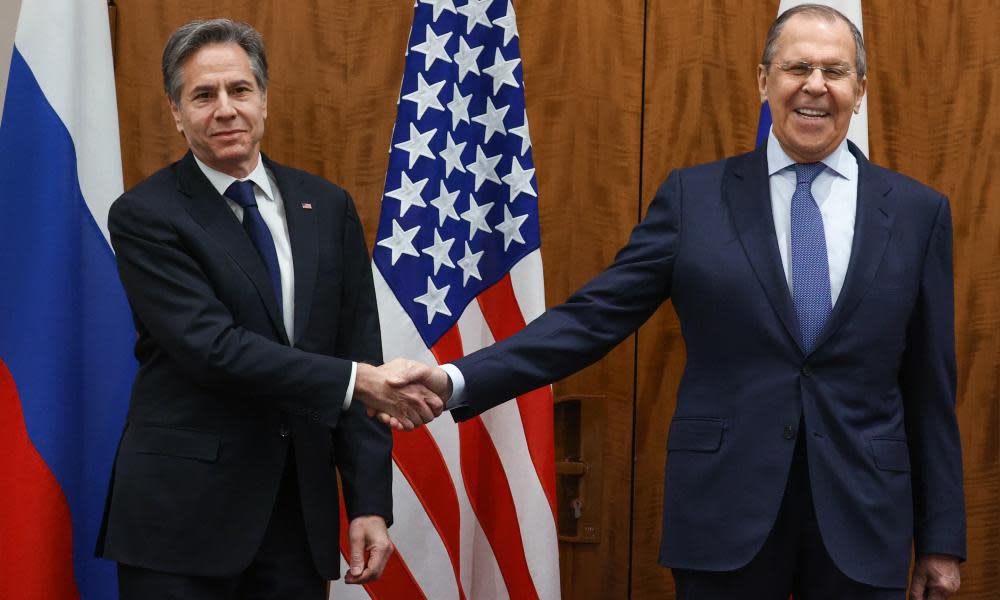The Observer view on US-Russia talks and tensions in Ukraine

Diplomatic talks calm tensions for now but Europe is left looking feeble and irrelevant
Talks about the Ukraine crisis between senior US and Russian diplomats, held in Geneva at the end of last week, appear to have calmed tensions, at least for now. The situation on Ukraine’s land and sea borders, where Moscow has amassed troops and powerful military assets, remains grave. But alarmist predictions of imminent, large-scale conflict have proved wide of the mark.
The dogged insistence of Antony Blinken, the US secretary of state, on pursuing diplomatic means to address Russia’s security concerns clearly made an impression on his notoriously intransigent opposite number, Sergei Lavrov. Russia’s foreign minister said the talks had been “constructive and useful” and agreed to continue them this week.
This may turn out to be a temporary reprieve. All the noxious factors that precipitated this crisis remain in play. President Vladimir Putin’s overarching aim is to undermine agreed, post-Soviet security structures in Europe and recreate a sphere of influence beyond Russia’s borders. He is desperate to stop Ukraine becoming a successful, fully independent, pro-western democracy whose example puts his corrupt, oppressive regime to shame.
To this end he wants Nato, in effect, to withdraw from countries on Russia’s western periphery that joined the alliance after the Soviet collapse. His list has now expanded to include Romania and Bulgaria as well as Estonia, Latvia, Lithuania and Poland. He is also demanding written pledges that Nato will never invite Ukraine, Georgia or Moldova to join and that the allies will pull back troops and defensive missile systems from eastern Europe.
The western democracies have stated plainly that they will not accept such blackmail. Yet, sadly, that is where consensus ends. There is no agreement, and much discord, about what to do if Russia does attack Ukraine, either directly by land, sea and air or indirectly, using asymmetric warfare methods, covert ops, special forces and “technical” countermeasures.
European leaders jointly bear responsibility for this lamentable state of affairs, which emboldens Putin. The performance of the US president, Joe Biden, has been less than totally impressive. He made a dangerous gaffe last week when he implied a “minor incursion” by Russia might be tolerated. But overall he has been admirably firm in resisting Russian pressure and seeking de-escalation.
Not so the European democracies, which have no joined-up policy at all. The German coalition is split between the Greens, who, for example, want to scrap the Nord Stream 2 gas pipeline from Russia, and pro-Moscow Social Democrats. In France, a huge gap is opening up between President Emmanuel Macron’s bold ideas about EU “strategic autonomy”, propounded again at a chaotic European parliament session in Strasbourg last week, and the reality of EU feuding, impotence and irrelevance.
Given he is deeply distrusted and disliked in many EU countries, it is unclear how Boris Johnson’s vow to knock European heads together and take charge of a united front to deter Putin, outlined in extraordinary Downing Street weekend briefings, can work. This sudden lurch into Churchillian war-fighting mode looks suspiciously like another attempt to distract attention from “partygate”. By exploiting international tensions in this way, Johnson and his Thatcher-imitating foreign secretary, Liz Truss, who has been missing in action so far, may only make matters worse.
The Ukraine standoff, having reached this extreme pitch, will not be resolved quickly. Even though few people actually want it, a conflict could be triggered accidentally. Hopefully, US diplomatic efforts will succeed – because a bypassed Europe, ignored by Russia and patronised by America, appears unable to help itself. Whether or not Putin ultimately gets his way or his war, Europe has already lost.

 Yahoo News
Yahoo News 